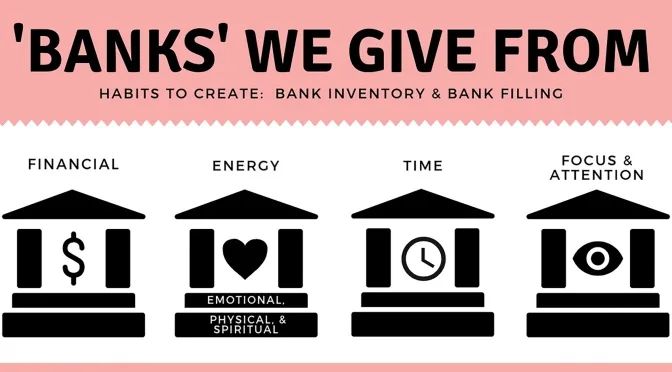
When 'giving' is hard
He ran down the hall with excitement yelling, “I’ve got money!” He pulled his hand-painted “doggy” bank off the top of his dresser, and the next thing I heard was “where did it go?” He stood in his doorway, bank upside down, and confusion mixed with disappointment on his brow. Where had all of that money gone? I reminded him that he gave it to his older brother to contribute to a “cereal” fund. (We don’t typically eat cereal in our house, and his teenage brother was taking donations to buy cereal.) “Oh yeah,” he recalled. He sauntered back into his room to return his bank to the top of his dresser; shoulders drooped with disappointment. He had nothing to spend and nothing to give.How many times have you felt the need or desire to give but felt the emptiness in your bank? Joy leaks out like a balloon with a pinhole. I’m not just talking about your financial bank; I’m also referring to your energy bank, your time bank, and even your emotional reserves.
We can’t give what we don’t have.
Giving out of empty "banks," spending what you don't have, can lead to bankruptcy; in your bank accounts, relationships, soul, and your health. I probably have no need to carry on with this point. You absolutely know what it feels like to have an overwhelmed schedule, and an underwhelmed soul. You know what it feels like to be needed, required to give, to WANT to give, but you’ve got nothin’.
My job is centered on helping women be healthy in mind, body, and soul. It is incredibly common for my first task to be convincing them that self-care is not selfish, and to buy into a belief that the more we pour in, the more we can pour out. I often remind them that loving their family and their friends can’t happen entirely when we give what’s left of us versus the best of us. If you run on empty, all you can provide is fumes.
Every time we commit, every time we say, "yes," every time we show up, we are giving. We will give out of at least one, if not multiple, banks all at once. So many of us are in the habit of checking our calendars, but not checking into our other banks before committing. When considering if we have enough time, it’s about more than checking our schedule for white space to squeeze in a new commitment; it’s also considering how the commitment will affect what comes before and after.
For example, if your neighbor asks if you are able to help them load a truck with furniture on Saturday morning, you may have the time, but how will it affect your commitments for the rest of the day? If you get up early, will that make you overtired since you will be up late the night before entertaining friends? It will require physical energy. If you use energy, will you have enough reserves to run errands, make dinner for your friend who had a baby, and help your kiddo with their homework project?
Another example overlooked a majority of the time is emotional energy. People in the service industry like doctors, counselors, pastors, nurses, and teachers understand the emotional energy bank. Helping people takes a lot of energy. They may LOVE what they do, but that does not negate the fact that it takes emotional, physical, and often spiritual reserves.
So, when your spouse wants to discuss big financial decisions and suggests talking after dinner, it is a good idea to check your emotional bank. Making decisions, and having serious conversations on a low emotional bank is never a good idea.
Awareness is one habit to create, but it's equally necessary and essential to have habits that continually fill those banks. What do you intentionally do to restore your emotional, physical, and spiritual energy? What do you do (or not do) to fill your focus and attention bank? What could you do to protect your time and choose to use it more intentionally for the things that matter the most in your life? How could you keep some time available for the opportunity to give time to someone in need when it arises? And financially, what are you actively doing to create margin there, so that you can give out of overflow without spending every dollar earned?
Frustration is often a result of the gap between our life priorities, and how we are actually living and giving, the bigger the gap, the bigger the frustration. In other words, if time with your family is a high priority and you are not spending quality time, you will find yourself frustrated. If giving to those in need is a high value and priority, but you’re living paycheck-to-paycheck, you’ll find yourself frustrated and defeated. If taking care of your patients, clients, kids, or friends by being fully present is a high priority and you are not present mentally, emotionally, or physically, you will be frustrated.
CHANGE Challenge:
If you are finding giving to be hard and frustrating in this season, check into your banks. Are you using them on the things that matter most and are of highest priority to you? Are you intentionally restoring them? Are you choosing your “yeses” after careful evaluation? What is one thing you should say “no” to today that you don’t have reserves for, and what is one thing you can do today that would fill your banks?
about the author...Jamie, the wife of her high school sweetheart and mom of 4 boys, has been in the fitness industry for 18 years. "Fuel the body, mobilize the soul" is her mission. Connect with Jamie on Facebook www.facebook.com/jamiebeeson1 or online at bit.ly/JamieBeeson
Originally printed in the pages of Simply Family Magazine’s November 2018 issue.
Never miss an issue, check out SFM’s digital editions, here!
